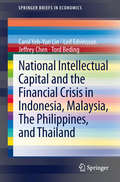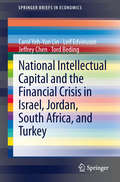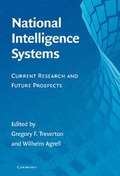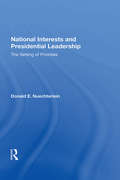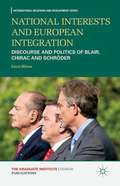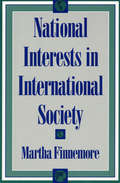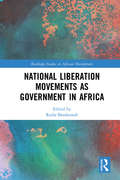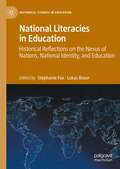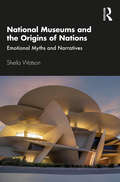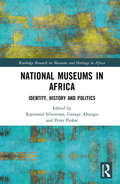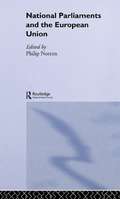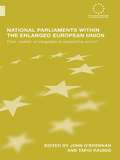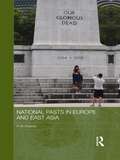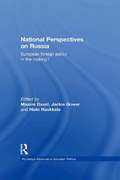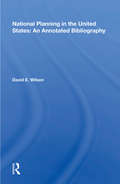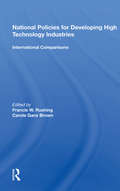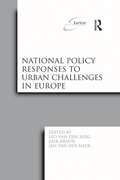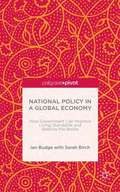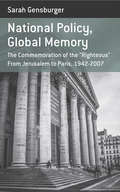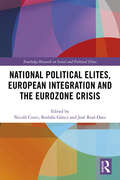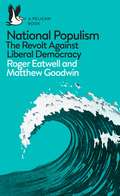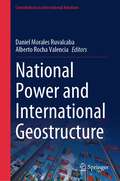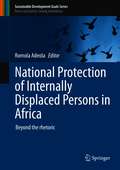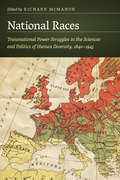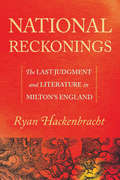- Table View
- List View
National Intellectual Capital and the Financial Crisis in Indonesia, Malaysia, The Philippines, and Thailand
by Leif Edvinsson Carol Yeh-Yun Lin Tord Beding Jeffrey ChenIn the first decade of the twenty-first century, the biggest event of worldwide proportion was the 2008 global financial crisis, which was caused primarily by ineffective governance, failed surveillance systems, and implementation flaws. While fiscal and monetary policies succeeded in pulling many countries out of a financial freefall, most economies have performed beneath pre-recession levels as governments continued to struggle with their finances. Examining the financial crisis from the viewpoint of intangible assets provides a different perspective from traditional economic approaches. National Intellectual Capital (NIC), comprised mainly of human capital, market capital, process capital, renewal capital, and financial capital, is a valuable intangible asset and a key source of national competitive advantage in today's knowledge economy. The authors--pioneers in the field--present extensive data and a rigorous conceptual framework to analyze the connections between the global financial crisis and NIC development. Covering the period from 2005 to 2010 across 48 countries, the authors establish a positive correlation between NIC and GDP per capita and consider the impact of NIC investment for short-term recovery and long-term risk control and strategy formulation. Each volume in a series of SpringerBriefs on NIC and the financial crisis provides in-depth coverage of the impact of the crisis, the aftermath, future prospects, and policy implications for a regional cluster. This volume focuses on Indonesia, Malaysia, The Philippines, and Thailand.
National Intellectual Capital and the Financial Crisis in Israel, Jordan, South Africa, and Turkey
by Leif Edvinsson Carol Yeh-Yun Lin Tord Beding Jeffrey ChenIn the first decade of the twenty-first century, the biggest event of worldwide proportion was the 2008 global financial crisis, which was caused primarily by ineffective governance, failed surveillance systems, and implementation flaws. While fiscal and monetary policies succeeded in pulling many countries out of a financial freefall, most economies have performed beneath pre-recession levels as governments continued to struggle with their finances. Examining the financial crisis from the viewpoint of intangible assets provides a different perspective from traditional economic approaches. National Intellectual Capital (NIC), comprised mainly of human capital, market capital, process capital, renewal capital, and financial capital, is a valuable intangible asset and a key source of national competitive advantage in today's knowledge economy. The authors--pioneers in the field--present extensive data and a rigorous conceptual framework to analyze the connections between the global financial crisis and NIC development. Covering the period from 2005 to 2010 across 48 countries, the authors establish a positive correlation between NIC and GDP per capita and consider the impact of NIC investment for short-term recovery and long-term risk control and strategy formulation. Each volume in a series of SpringerBriefs on NIC and the financial crisis provides in-depth coverage of the impact of the crisis, the aftermath, future prospects, and policy implications for a regional cluster. This volume focuses on Israel, Jordan, South Africa, and Turkey.
National Intelligence Systems
by Gregory F. Treverton Wilhelm AgrellA series of investigations, especially in the United States and Britain, have focused attention on the performance of national intelligence services. At the same time, the onset of an era of terrorism and a broad span of trans-national security challenges has highlighted the crucial role of intelligence. This book takes stock of the underlying intellectual sub-structure of intelligence. For intelligence as for other areas of policy, serious intellectual inquiry is the basis for improving the performance of real-world institutions. The volume explores intelligence from an intellectual perspective, not an organizational one. Instead the aim of the book is to identity themes that run through these applications, such as the lack of comprehensive theories, the unclear relations between providers and users of intelligence, and the predominance of bureaucratic organizations driven by collection. A key element is the development, or rather non-development, of intelligence toward an established set of methods and standards and, above all, an ongoing scientific discourse. Here, in the transformation from an experience-based proto-science to a science of intelligence in-being, the book argues, lies perhaps the most fundamental challenge for a field of immense impact on the international community, on nations, and on individuals.
National Interests And Presidential Leadership: The Setting Of Priorities
by Donald E. NuechterleinMany scholars have ignored the concept of ‘national interest†simply because no logical, systematic means of dealing with this key aspect of international politics has been available. A new approach to defining national interest forms the basis for this study of presidential decisions on U.S. involvement in foreign wars. Professor Nuechterlein looks at various crisis situations to determine what defense, economic, world order, and ideological interests are at stake; he identifies sixteen cost/risk and value factors that affect the U.S. view of which interest is most vital in a given situation. In any dispute, it is the interest that is considered vital—too important to compromise—that is the key element in crisis decisions. Professor Nuechterlein uses his analytical framework to examine the ways Presidents Wilson, Roosevelt, Truman, Johnson, and Nixon perceived the national interest when making their decisions to begin or extend U.S. war involvement. He assesses the value of National Security Council participation in the decision-making process and presents case-study analyses of three imminent U.S. foreign policy concerns—Quebec’s possible separation from Canada, the Panama Canal Treaty, and the potential for race war in South Africa—with an epilogue on the challenges facing Carter. The author suggests that the most important U.S. national interest in the future will be economic, with energy conservation a top priority.
National Interests and European Integration
by Katrin MilzowThis study combines an account of Blair, Chirac, Schröder and their attitudes towards European integration. It analyzes political discourses on 'national interests' and the EU, the frequently debated role of political discourse, the concept of national interest, and offers an alternative point of view on intergovernmental interaction.
National Interests in International Society
by Martha FinnemoreHow do states know what they want? Asking how interests are defined and how changes in them are accommodated, Martha Finnemore shows the fruitfulness of a constructivist approach to international politics. She draws on insights from sociological institutionalism to develop a systemic approach to state interests and state behavior by investigating an international structure not of power but of meaning and social value. An understanding of what states want, she argues, requires insight into the international social structure of which they are a part. States are embedded in dense networks of transnational and international social relations that shape their perceptions and their preferences in consistent ways. Finnemore focuses on international organizations as one important component of social structure and investigates the ways in which they redefine state preferences. She details three examples in different issue areas. In state structure, she discusses UNESCO and the changing international organization of science. In security, she analyzes the role of the Red Cross and the acceptance of the Geneva Convention rules of war. Finally, she focuses on the World Bank and explores the changing definitions of development in the Third World. Each case shows how international organizations socialize states to accept new political goals and new social values in ways that have lasting impact on the conduct of war, the workings of the international political economy, and the structure of states themselves.
National Liberation Movements as Government in Africa (Routledge Studies in African Development)
by Redie BereketeabAfrica is well known for the production of national liberation movements (NLMs), stemming from a history of exploitation, colonisation and slavery. NLMs are generally characterised by a struggle carried out by or in the name of suppressed people for political, social, cultural, economic, territorial liberation and decolonisation. Dozens of NLMs have ascended to state power in Africa following a successful violent popular struggle either as an outright military victory or a negotiated settlement. National Liberation Movements as Government in Africa analyses the performance of NLMs after they gain state power. The book tracks the initial promises and guiding principles of NLMs against their actual record in achieving socio-economic development goals such as peace, stability, state building and democratisation. The book explores the various different struggles for liberation, whether against European colonialism, white minority rule, neighbouring countries, or for internal reform or regime change. Bringing together case studies from Somalia, Somaliland, Uganda, Ethiopia, Eritrea, South Sudan, Namibia, Angola, Mozambique, South Africa, Zimbabwe, and Algeria, the book builds a comprehensive analysis of the challenges NLMs face when ascending to state power, and why so many ultimately end in failure. This is an ideal resource for scholars, policy makers and students with an interest in African development, politics, and security studies.
National Literacies in Education: Historical Reflections on the Nexus of Nations, National Identity, and Education (Historical Studies in Education)
by Stephanie Fox Lukas BoserThis edited volume provides an international overview of research on nationalism in education. In light of emerging neo-nationalism and national answers to global challenges, the book contributes to a growing and desperately needed discussion on how we can understand and deal with the involvement of education in phenomena of nations and nationalisms in school, curriculum, theory and research. In this book, internationally renowned scholars as well as doctoral students and postdocs from Asia, Europe, America, and Australia show how the history of education can theoretically and empirically deal with the concept(ion)s of nation and nationalism.
National Museums and the Origins of Nations: Emotional Myths and Narratives
by Sheila WatsonNational Museums and the Origins of Nations provides the first international survey of origins stories in national museums and examines the ways in which such museums use the distant past as a vehicle to reflect the concerns of the political present. Offering an international comparison of institutions in China, North and South America, the Middle East, Europe and Australia, the book argues that national museums tell us more about what sort of community a nation wishes to be today, than how and why that nation came into being. Watson also reveals the ways in which narrative and exhibition design attempt to engage the visitor in an emotional experience designed to promote loyalty to, and pride in, the nation, or to remind visitors who are not citizens that they do not belong. These narratives of origin are, it is claimed, based on so-called factual accuracies, but this book reveals that they are often selective, emotional and rarely critiqued within institutions. At a time when nationalism is very much back on the political agenda, this book highlights how museums reflect current political and social concerns. National Museums and the Origins of Nations will appeal to academics and students engaged in the study of museums, heritage, politics, nationalism and history.
National Museums in Africa: Identity, History and Politics (Routledge Research on Museums and Heritage in Africa)
by Raymond Silverman George Abungu Peter ProbstNational Museums in Africa brings the voices of African museum professionals into dialogue with scholars and, by so doing, is able to consider the state of African national museums from fresh perspectives. Covering all regions of the continent, the volume’s thirteen chapters allow for a deep and nuanced understanding of the intricate interplay between past and present in contemporary Africa. Taking stock of the shifting museum landscape in Africa, with new players like China and South Korea challenging the conditions of cultural exchange, the book demonstrates that national museums are being rediscovered as important sites of political engagement and cultural negotiation. This is the first book to critically examine the roles national museums in Africa have played in the societies in which they are situated, but it is also the first to consider the roles that national museums might play in current debates concerning the restitution and repatriation of cultural patrimony taken from Africa during the colonial era. Informed by a comparative and interdisciplinary perspective, this ground-breaking book will appeal to anyone interested in museums in Africa. It will be particularly useful to scholars and students working in the areas of museum and heritage studies, African studies, anthropology, archaeology, history, art history and cultural studies.
National Parliaments and the European Union
by Philip NortonThis guide is intended for busy legal practitioners and all other professionals who are involved in the criminal justice system and who require quick reference to the provisions of the 1994 Act.
National Parliaments within the Enlarged European Union: From 'Victims' of Integration to Competitive Actors? (Routledge Advances in European Politics)
by Tapio Raunio John O’BrennanThis book presents a wide range of perspectives on the role of national parliaments in EU politics and policy-making. Many accounts of the role of national parliaments portray them as passive victims of European integration. This study instead examines their role within the EU policy-making process, looking at efforts to address perceived democratic and information ‘deficits'. Bringing together leading scholars in the fields of European studies, public policy analysis, and legislative research, this new volume provides: a thorough and wide-ranging synthetic analysis of the position of national parliaments within the EU policy-making structures a range of detailed country studies, including for the first time an analysis of the new member state parliaments in Central and Eastern Europe an analysis of the significant changes to the position of national parliaments brought about by the recent Convention process and the provisions of the EU’s Constitutional Treaty. Making an important contribution to an emerging comparative literature on the parliamentary dimension to EU public policy-making, National Parliaments within the Enlarged European Union will interest students and researchers in the fields of European integration, EU politics, and public policy analysis.
National Pasts in Europe and East Asia (Routledge Studies in the Modern History of Asia)
by Peter W. PrestonWith the rise of industrial capitalism in Europe and the related imposition of colonial rule in much of East Asia, both Europe and East Asia have intertwined histories that continue to shape their political thinking and political decision making. The contemporary interactions of the two regions – now once again major trading partners – will both depend upon and facilitate deeper understandings of their respective sets of national pasts. This book compares national pasts as well as the current processes of change taking place in Europe and East Asia, including the dynamics of the European Union in Europe and the re-emergence of the historical centre of China in East Asia. It argues that as the change unfolds in the economic, social and political fields, the various national pasts embedded with the polities of the two regions will also need to be revisited and reworked. This book makes an invaluable contribution to research on comparative politics, as well as studies on South East Asia and Europe.
National Perspectives on Russia: European Foreign Policy in the Making? (Routledge Advances in European Politics)
by Jackie Gower Hiski Haukkala Maxine DavidThis book presents a ground-breaking comparative study of the bilateral relations of all 27 EU member states with Russia and an assessment of their impact on the EU’s efforts to conduct a coherent and effective policy towards its most important neighbour. While there has been a lot of research on European foreign policy, there has been much less on the role that national foreign policies play in it. Based on a common analytical framework, this book offers a detailed analysis of ‘national perspectives on Russia’ and how they interact with and affect policymaking at the EU-level. The authors provide deep insights into the relationship between individual states and Russia looking at a range of policy areas: economics, trade, energy, security, culture and education. They are not only interested in examining policy failure but also probing the possibilities of seeing national foreign policies and the bilateralism with third parties that they often entail as a potentially positive resource for the European Union. As Russia is an example of a particularly hard case for EU foreign policy, this book yields important insights concerning the possibilities as well as limits of developing a common EU policy in the future. It will be of interest to students and scholars of European politics, EU Studies, Russian politics, foreign policy studies and international politics.
National Planning In The United States: An Annotated Bibliography
by David E. WilsonThis annotated bibliography of more than 2,000 entries, current through 1977, sheds light on the national planning idea as a substantive issue in past, present, and future U.S. public policy; presents a bibliographic structure that suggests new emphases, relationships, and interdisciplinary approaches; and makes more easily accessible to students a
National Policies For Developing High Technology Industries: International Comparisons
by Francis W. Rushing Carole Ganz BrownThis book discusses the informatics industry in Brazil, France, India, Japan, Korea, Mexico, Taiwan, and the U.S., as models to examine the role of governments in promoting advanced technology. It considers the long-range policy analysis and evaluation necessary for fostering competitive industry.
National Policy Responses to Urban Challenges in Europe (Euricur Ser. (european Institute For Comparative Urban Research) Ser.)
by Erik Braun Leo van BergThis book presents a unique overview of urban policy conducted by national authorities in the fifteen 'old' member states of the EU. Focussing on recent changes in the development of the larger cities and changes in policymaking by national authorities with respect to urban development, the book is structured around 15 'country chapters', written by national experts in the field of urban development. The book provides an up-to-date source of information, and will be of importance to anyone involved in the role and development of European cities as well as the formulation and delivery of associated national policies.
National Policy in a Global Economy: How Government Can Improve Living Standards and Balance the Books
by Sarah Birch Ian BudgeThis study offers an analysis of the UK's current economic policy options and a plan for improving life for ordinary citizens via a sensible and realistic understanding of governments' limited ability to manage economic performance. It provides a manifesto which political parties could immediately adopt to make life better for all.
National Policy, Global Memory: The Commemoration of the Righteous From Jerusalem to Paris, 1942-2007
by Sarah GensburgerSince 1963, the state of Israel has awarded the title of "Righteous among the Nations" to individuals who risked their lives sheltering Jews during the Holocaust. This distinction remained solely an Israeli initiative until the late 1990s, when European governments began developing their own national categories, the most prominent of which was the "Righteous of France," honoring those who protected Jews during the Vichy regime. In National Policy, Global Memory, Sarah Gensburger uses this dramatic episode to lend a new perspective to debates over memory and nationhood. In particular, she works to combine two often divergent disciplines-memory studies and political science-to study "memory politics" as a form of public policy.
National Political Elites, European Integration and the Eurozone Crisis (Routledge Research on Social and Political Elites)
by Nicolò Conti Borbála Göncz José Real-DatoThe global financial, economic and sovereign debt crisis since 2008 has led to increases in political disaffection among citizens, a loss of legitimacy of political institutions, the discredit of mainstream parties and the rise of extremist or anti-system political alternatives. This comparative volume sheds greater light on this critical juncture in the recent history of the European Union (EU) by focusing on the evolution of attitudes of national political elites. It examines whether the crisis has affected the legitimacy of the EU integration project as perceived by national political elites and, consequently, if the elite consensus that constituted one of the most solid fundamentals supporting that project has been eroded. Analysing these changes across the different dimensions in which support for the EU is organized and its relationship with the evolution of support towards European integration among citizens in member states, the book addresses a basic question: How have these events affected the perceptions of the EU of national political elites? Ultimately, it sheds light on the evolution of the relationship between the perception of the EU and the national contexts, as well as the likely evolution of the project of European integration in the near future. This book will be of key interest to scholars and students of political elites, EU politics, European integration, political parties, and more broadly to comparative politics, European studies and sociology.
National Populism: The Revolt Against Liberal Democracy (Pelican Books)
by Matthew Goodwin Roger EatwellA SUNDAY TIMES BOOK OF THE YEARA crucial new guide to one of the most important and most dangerous phenomena of our time: the rise of populism in the WestAcross the West, there is a rising tide of people who feel excluded, alienated from mainstream politics, and increasingly hostile towards minorities, immigrants and neo-liberal economics. Many of these voters are turning to national populist movements, which pose the most serious threat to the Western liberal democratic system, and its values, since the Second World War. From the United States to France, Austria to the UK, the national populist challenge to mainstream politics is all around us.But what is behind this exclusionary turn? Who supports these movements and why? What does their rise tell us about the health of liberal democratic politics in the West? And what, if anything, should we do to respond to these challenges?Written by two of the foremost experts on fascism and the rise of the populist right, National Populism is a lucid and deeply-researched guide to the radical transformations of today's political landscape, revealing why liberal democracies across the West are being challenged-and what those who support them can do to help stem the tide.
National Power and International Geostructure (Contributions to International Relations)
by Daniel Morales Ruvalcaba Alberto Rocha ValenciaThis book addresses three innovative aspects for the study of International Relations: first, proposes a novel theoretical-methodological framework for the study of national power, and based on this, a quantitative analysis technique is formulated that allows us to study the evolution of state power over almost five decades. Second, states play a fundamental role in the international system, which is why the study of their roles in the world cannot be limited to old, insufficient, and contradictory categorizations. Having new categories of states becomes an even more urgent task in the rapidly changing international order than it is today. This book proposes nine categories of powers and states that cover all the countries that currently exist. Third, the international geostructure of world power is proposed, which represents a new theoretical notion that helps to explain how the international insertion of states and their possibilities of action are conditioned by the unequal distribution of national power and by their structural positioning in the international system. This book is for all students of International Relations, academics, and people who want to understand national power as a fundamental factor in relations between countries.
National Protection of Internally Displaced Persons in Africa: Beyond the rhetoric (Sustainable Development Goals Series)
by Romola AdeolaThis volume examines the protection of internally displaced persons (IDPs) through an interdisciplinary lens, with a focus on IDPs in Africa. The novelty of this book resonates from the fact that it explores national perspectives on internal displacement, with the aim of providing a well-grounded engagement on the subject of internal displacement, for which very little exists. The chapter authors are drawn from various disciplines and institutional backgrounds, and provide context-based analysis and examine the situation in countries with significant population displacement. The work is a timely engagement, as the issue of internal displacement has emerged as a pertinent concern in Africa. Each of the chapters in this book draw on significant context-based knowledge and on issues for which there is a need for pertinent attention across the African countries. This book will be a significant reference point for researchers, professors, practitioners, judges, policy makers, international organizations, regional bodies, lawyers and scholars in the field of migration, forced migration, and regional institutions.
National Races: Transnational Power Struggles in the Sciences and Politics of Human Diversity, 1840-1945 (Critical Studies in the History of Anthropology)
by Richard McMahonNational Races explores how politics interacted with transnational science in the nineteenth and early twentieth centuries. This interaction produced powerful, racialized national identity discourses whose influence continues to resonate in today’s culture and politics. Ethnologists, anthropologists, and raciologists compared modern physical types with ancient skeletal finds to unearth the deep prehistoric past and true nature of nations. These scientists understood certain physical types to be what Richard McMahon calls “national races,” or the ageless biological essences of nations. Contributors to this volume address a central tension in anthropological race classification. On one hand, classifiers were nationalists who explicitly or implicitly used race narratives to promote political agendas. Their accounts of prehistoric geopolitics treated “national races” as the proxies of nations in order to legitimize present-day geopolitical positions. On the other hand, the transnational community of race scholars resisted the centrifugal forces of nationalism. Their interdisciplinary project was a vital episode in the development of the social sciences, using biological race classification to explain the history, geography, relationships, and psychologies of nations.National Races goes to the heart of tensions between nationalism and transnationalism, politics and science, by examining transnational science from the perspective of its peripheries. Contributors to the book supplement the traditional focus of historians on France, Britain, and Germany, with myriad case studies and examples of nineteenth- and early twentieth-century racial and national identities in countries such as Russia, Italy, Poland, Greece, and Yugoslavia, and among Jewish anthropologists.
National Reckonings: The Last Judgment and Literature in Milton’s England
by Ryan HackenbrachtDuring the tumultuous years of the English Revolution and Restoration, national crises like civil wars and the execution of the king convinced Englishmen that the end of the world was not only inevitable but imminent. National Reckonings shows how this widespread eschatological expectation shaped nationalist thinking in the seventeenth century. Imagining what Christ's return would mean for England's body politic, a wide range of poets, philosophers, and other writers—including Milton, Hobbes, Winstanley, and Thomas and Henry Vaughan,—used anticipation of the Last Judgment to both disrupt existing ideas of the nation and generate new ones. Ryan Hackenbracht contends that nationalism, consequently, was not merely a horizontal relationship between citizens and their sovereign but a vertical one that pitted the nation against the shortly expected kingdom of God. The Last Judgment was the site at which these two imagined communities, England and ecclesia (the universal church), would collide. Harnessing the imaginative space afforded by literature, writers measured the shortcomings of an imperfect and finite nation against the divine standard of a perfect and universal community. In writing the nation into end-times prophecies, such works as Paradise Lost and Leviathan offered contemporary readers an opportunity to participate in the cosmic drama of the world's end and experience reckoning while there was still time to alter its outcome.
